INTERVIEW: Angelou
The Real Sound of Legendary Pop
By: Elena Quintana

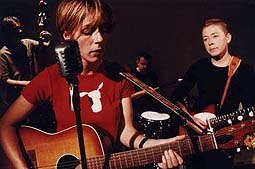 Holly Lerski, the irresistible voice of Angelou, shows us the real meaning of pop lifestyle mixed with the traditional folk music.
Holly Lerski, the irresistible voice of Angelou, shows us the real meaning of pop lifestyle mixed with the traditional folk music.If we were to divide your style up into percentages. What percentage would correspond to traditional folk music?
"Well in England, when people talk about 'traditional' folk music, they usually mean very old, traditional songs reinterpreted by folk singers. We don't really do that. However I do feel closer to people like Nick Drake, Fairport Convention, John Martyn - the Witchseason lot really. I'd say my songs draw on the same 'pastoral' roots. But I actually feel a lot closer to American folk, with it's blues and jazz elements, and I really love the whole Greenwich scene. People like Tim Buckley, Joni Mitchell, Arlo Guthrie. It's probably from having learnt guitar in the 70's - that was the kind of style of music you learnt from. As for percent - say about 30%!"
Do you think British pop is going through a good moment? And singer-songwriters?
"Yes I do - I keep waiting for the bubble to burst, like it always does when popular culture gets hold of something and flogs it to death, but things are definitely getting better. There are still lots of 'dance-troupe' pop bands in Britain, but now there are also loads and loads of bands and artists with songs. They even write them themselves - amazing! Of course, they were always around, you just never got to hear them (no thanks to the music industry) but they're coming through once again now."
Do groups like Angelou have difficulty in finding Music Festivals which have a similar style to your own?
"Yes, in the past we have, and probably because I play acoustic. A lot of the time it's seemed like nobody has known where to place us - folk, folk-pop, indie, acoustic, etc. It's so ridiculous - like there really are only X number of genres of music, honestly! It always brings to mind the Blues Brothers quote about having "two types of music here, Country & Western". Then again even the great man Dylan had those problems when he went electric. But there are promoters, labels etc, out there who are still into new music whatever the roots, and those are the people we tend to work with."
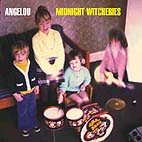 For me two tracks from "Midnight Witcheries": "Glittering Creatures" and "This is not a love song" stand out from the others. What can you tell us about both tracks?
For me two tracks from "Midnight Witcheries": "Glittering Creatures" and "This is not a love song" stand out from the others. What can you tell us about both tracks?
"Well 'Glittering Creatures was inspired by Norfolk - the region of England I live in, with it's big skies and landscapes - and it's about two things really. It's about the feeling of space and freedom I get from living in the countryside, and how good it makes me feel (compared to life in the city). And it's also about magic - I think modern living in Britain has made us feel very disconnected from life and nature, it's all just work, work, work, and nothing to do with the extraordinary. When I'm out in the wilds I just love the feeling of 'life' fizzing through my veins, and I just wanted to somehow get that across. I suppose it's a bit of a shaman song really.
'This Is Not A Love Song' is a lot simpler - it was written about a few people. I'm a bit of a believer in being the mistress of my own fortune, and I do get very impatient with people who blame everyone & everything but themselves. I suppose I just hate to think people are wasting there lives, so this is my 'pick yourself up, dust yourself down' song."
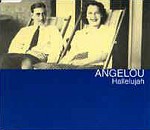 How did the idea of doing a cover of Leonard Cohen's "Hallelujah" come about? When you do a cover version of a track as renowned as this one, even if it's done with great respect, aren't you afraid of possible criticism?
How did the idea of doing a cover of Leonard Cohen's "Hallelujah" come about? When you do a cover version of a track as renowned as this one, even if it's done with great respect, aren't you afraid of possible criticism?
"That recording was actually our first demo which Haven Records, our label in England, heard in 1997 and chose as a debut release. We recorded it at the end of '96, having just got Angelou together, and at the time 'Hallelujah' was basically one of the first songs we played together which had the feel of 'Angelou'. I was a big fan of Jeff Buckley, I loved his version of 'Hallelujah' and it just seemed like a pretty awe-inspiring starting point for us. Also, at that time, I was just discovering I had a voice, so 'Hallelujah' was a real challenge for me. Anyway, we had some spare studio time, so we recorded it. And yes, I did have reservations about releasing it, and we were criticised, but it sort of marked our humble beginnings, so it became a very meaningful song for us."
Angelou's songs frequently refer to the countryside and the seasons of the year. I imagine that the changeable climate of your country must to a certain extent have something to do with the melancholic style of your tracks--
"Oh yes, definitely. And it's funny you brought that up because I recently read this really cool thing by the poet Ted Hughes, where he talked about the weather in England, and how it really effects people's moods. And it's so true if you think about it - we're just human barometers really. With all the electricity in the air, and the changes of pressure, it's bound to have some effect on all the synapses sparking in your brain. And especially so here in Britain, on an island, where we experience a constantly changing climate. But I appreciate that - it gives you a real sense of time passing, which maybe makes you seem a bit melancholic at times , but I feel richer for it."
The title of the record "Midnigh Witcheries", which is mentioned in your track "Bitter Honey", refers to the almost night recording of "While You Were Sleeping". Can you comment on that recording?
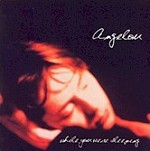 "Unlike 'Automiracles', which we recorded in around a week, we made 'While You Were Sleeping' over a few months, in snatched sessions through the night. We'd basically run out of time and most of the money in the initial stage of recording, so it was just cheaper doing the 'grave-yard shift'. What we'd Jo and I would do is go in around midnight, the engineers would go home, and we'd basically bluff our way through. We didn't really know what we were doing, but somehow we learnt what buttons to press, and incredibly we came out with an album. At the time it seemed completely crazy, and yet it was great because we did exactly what we wanted to do. Lots of it was technically wrong, but we had nobody there to tell us otherwise, so we just did it. With that, and the fact that the studio was actually a converted church hall in the grounds of a very spooky medieval churchyard, the whole thing was very nocturnal and witchy."
"Unlike 'Automiracles', which we recorded in around a week, we made 'While You Were Sleeping' over a few months, in snatched sessions through the night. We'd basically run out of time and most of the money in the initial stage of recording, so it was just cheaper doing the 'grave-yard shift'. What we'd Jo and I would do is go in around midnight, the engineers would go home, and we'd basically bluff our way through. We didn't really know what we were doing, but somehow we learnt what buttons to press, and incredibly we came out with an album. At the time it seemed completely crazy, and yet it was great because we did exactly what we wanted to do. Lots of it was technically wrong, but we had nobody there to tell us otherwise, so we just did it. With that, and the fact that the studio was actually a converted church hall in the grounds of a very spooky medieval churchyard, the whole thing was very nocturnal and witchy."
In some of your tracks you refer to a well-known Billie Holiday track. Has she influenced you in any way?
"You mean the 'Strange Fruit' reference? Yes, I grew up hearing a lot of that kind of music - my grandparents were big fans of people like Billie & Ella Fitzgerald, and I've got a lot of respect for that kind of music, women Blues singers especially. It just seemed very honest and raw, and so strong too, because I guess they had to be. And with Billie, well she's about as raw and honest as you can get. Actually I'm sure that's what does it for me with American Folk; the Spirituals of the early Afro-Americans are such a big part of that whole history."
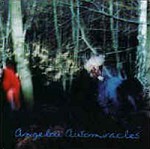 Since your first LP "Automiracle" was released in 98 a lot of things have happened in Angelou's life. You've grown in the eyes of the public and the critics with patience and with perseverance. As a group do you feel more mature and more prepared?
Since your first LP "Automiracle" was released in 98 a lot of things have happened in Angelou's life. You've grown in the eyes of the public and the critics with patience and with perseverance. As a group do you feel more mature and more prepared?
"Oh yes, much more. We released an e.p., toured with a major artist and recorded an album in our first year together - there is no way we were prepared for all that! And I'm sure that was evident to a lot of people- it was certainly evident to me! But now, a few years on, I feel a lot different. I don't feel so tossed about by opinions. I've also learnt that there are some journalists who really love music, and there are other's who really love to read their own writing, so you should take their opinions on board, but leave it at that. Never let it effect the kind of music you're going to make."
In your opinion, what was the most admirable quality of Jeff Buckley?
"Probably the way he was so intuitive with his music. He was an incredibly eclectic musician, with this real mish-mash of influences, which just seemed to pour out. And he didn't let 'taste' inhibit that - instead he'd play Edith Piaf alongside Smiths or Nusrat Fateh Ali Khan, and why not? He was just completely guided by his muse, a true artist - I loved that about him."
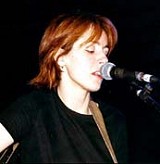 After playing bass in the power pop group The Nivens, what remained of this style in the music of Holly Lerski? And the punk of the Stranglers?
After playing bass in the power pop group The Nivens, what remained of this style in the music of Holly Lerski? And the punk of the Stranglers?
"Well The Nivens were pop, but in a jangley, REM/Byrds way. We were listening to a lot of 60's music at the time - the flower-power era with bands like the Mama's & Papa's, Jefferson Airplane, etc. And Hendrix & Cream were still old favourites of mine, so it was sort of indie-folk-pop with a twist of psychedelia to it. I still enjoy listening to that kind of music, so it probably filters through to our poppier songs. With The Stranglers, at 12 years old they became my first musical heroes. They were just very, very cool, literary, and I suppose Romantic in a Classical sense. They wore Black, looked very serious, talked about Communism, European literature, Japanese culture AND they were punks. So I collected absolutely everything by them. I suppose their influence was felt many years later, when I started to write my own songs, because I went to the same places for inspiration - films, books, that sort of thing."
Do you feel comfortable doing acoustic version of your tracks?
"I think so - I always just see it as another dimension to the song. And I just love playing guitar anyway, so it's a challenge getting something new, and interesting. You have to really work at it. But that's what I loved about Nick Drake - one man with a guitar playing these chords with these weird tunings you'd never work out in a million years. Actually, it's also what I loved about Jeff Buckley's playing - he really took the songs way beyond the usual."
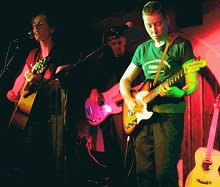 What's Angelou like live? What can the public expect when they see you live in the near future?
What's Angelou like live? What can the public expect when they see you live in the near future?
"That's a very difficult question to answer. One of the most integral things about us is the fact that Jo and I have known each other, and played guitar together, since 1982. And though we lost touch for a few years, when we started playing together again we instantly knew we had something special. So live, I think that comes across. Other things? Well, I guess we're not a one trick pony - the songs and sounds are pretty diverse, going from very intimate to very loud. Oh, and we're being joined by a two new members, both women, so who knows what to expect!"

